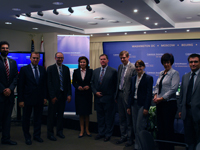Registration
Thank you!
You will receive an email confirming your registration.
IMGXYZ3319IMGZYXNearly two decades since the collapse of the Soviet Union, Ukraine’s political system continues to evolve. To mark twenty years of Ukraine’s independence, Carnegie hosted two panel discussions focused on judicial and legislative reform, foreign policy, European integration, and relations with Russia. Carnegie’s Matthew Rojansky and Thomas O. Melia from the State Department opened the discussion and Gavin Weise from the International Foundation for Electoral Systems and Rojansky moderated the panels.
Domestic Developments in Ukraine
- Judicial Reform: Maintaining an independent judiciary is a serious challenge in Ukraine’s current political climate, argued Roman Romanov from the International Renaissance Foundation. Judges face intimidation and threats from the regime and the security services, and Ukrainian citizens have little trust in the courts. In contrast to the rule of law in the West, in Ukraine, “the prosecutors control the judiciary,” he explained. There is a general belief that one is “presumed guilty until proven innocent.” Furthermore, growing threats to fundamental freedoms – such as restrictions on freedom of assembly – could potentially damage Ukraine’s relations with other states, he added.
- Legal Reform: A special commission within Ukraine’s parliament is currently negotiating a draft election law that seeks to decrease majoritarian rule, allow political blocs to participate, and reduce the number of votes needed to obtain a seat in parliament to one percent, noted Victoria Gumeniuk from the Ukrainian non-governmental organization Center UA. Valeria Lutkovskaya, Ukraine’s Envoy to the European Court of Human Rights, highlighted several issues related to Ukraine’s legal system, such as the use of torture in pre-trial detentions and the overall effectiveness of the prosecution, and said that a forthcoming criminal procedure would address these concerns. In the end, the Ukrainian government is more concerned with appearances than substantive change, argued Gumeniuk. It wants “to look reformist; to have the air of being full of ideas, full of initiatives, full of a launched reform process.”
- Supporting Civil Society: Deputy Head of the Presidential Administration Maryna Stavniychuk explained that the Ukrainian government has recently passed laws to strengthen the role of civil society, including a law on access to public information in 2010 and laws on social dialogue and volunteer activities in 2011. A new draft law on non-governmental organizations seeks to ease official registration and provide more government funding opportunities, she added.
Ukraine Between East and West
- Foreign Policy: Ukrainian Deputy Foreign Minister Pavlo Klimkin argued that Ukraine’s foreign policy has been “quite effective.” Despite strategic partnerships with Russia, the United States, and increasingly, China, he argued that Ukraine can still pursue European integration. He added that the Organization for Security and Cooperation in Europe (OSCE) is in “deep crisis” but stressed that Ukraine plans to implement an “ambitious agenda” when it assumes chairmanship in 2013.
- European Integration: Klimkin described European integration as a priority for “national development and internal policy.” Ukraine’s draft Association Agreement with the European Union serves as a framework for domestic reform and is the best tool to proceed with European integration, he added. Carnegie’s Olga Shumylo-Tapiola pointed out that while the Ukrainian government might still prioritize European integration, popular support plummeted following the political stagnation that set in after the 2004 Orange Revolution. She suggested that the European Union might have missed its best window of opportunity to engage Ukraine.
- Ukraine’s Future: Shumylo-Tapiola argued that Ukraine is at a crossroads and faces three possible political trajectories. The Yanukovych administration can either pursue European integration through reform, move closer to Moscow by joining Russia’s customs union, or remain in a stagnant grey zone. She added that while it is true that Kyiv must sort out domestic problems, Brussels should also learn to balance its values and long-term interests. If Ukraine cannot join the European Union, other post-Soviet states with EU aspirations such as Moldova and Georgia will have a slim chance of joining. In the end, the path that Ukraine ultimately takes rests with Ukrainians themselves, she concluded.
- Ukraine and Russia: Carnegie Moscow’s Lilia Shevtsova said that twenty years of Ukraine’s independence have been twenty years of headache for Russia. She described Ukraine as a test case for the West and Russia and offered three different Russian perspectives on Ukraine.
- The Kremlin’s View: Shevtsova argued that Russian officials continue to view pro-western Ukrainian politicians such as Yulia Tymoshenko as opponents. The Russian government maintains the unhelpful attitude of “you are either with us or against us” in its relations with Ukraine, she said. Contrary to the Kremlin’s expectations, Yanukovych did not embrace Russia after becoming president in 2010, which has caused considerable frustration in Moscow, she added.
- Liberal View: Shevtsova argued that Russian liberals see Ukraine “not as a borderland but as a bridge” between Russia and Europe. Ukraine’s engagement with the West is evidence that “Orthodox Slavic mentality and culture and the Soviet past” are not obstacles to joining the European community, she added.
- Popular View: 62 percent of Russians have positive feelings towards Ukraine, she noted. According to recent polls, 53 percent of Russians favor new relations with Ukraine, and only 33 percent believe Ukraine should remain dependent on Russia.
- The Kremlin’s View: Shevtsova argued that Russian officials continue to view pro-western Ukrainian politicians such as Yulia Tymoshenko as opponents. The Russian government maintains the unhelpful attitude of “you are either with us or against us” in its relations with Ukraine, she said. Contrary to the Kremlin’s expectations, Yanukovych did not embrace Russia after becoming president in 2010, which has caused considerable frustration in Moscow, she added.
